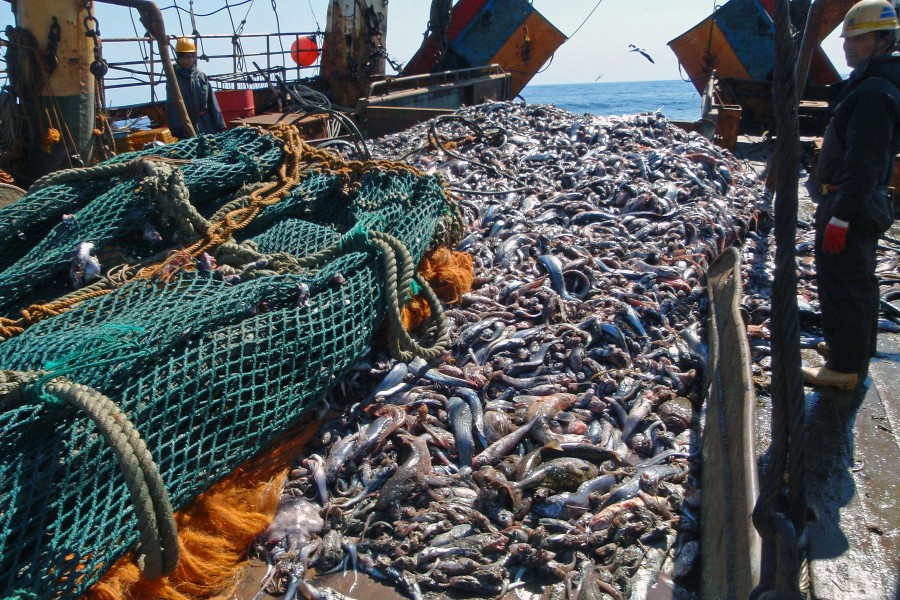
Published :
Updated :

The Bay of Bengal is one of the 64 largest marine ecosystems globally. As a maritime country, Bangladesh has a larger share of the Bay of Bengal, covering 118, 813 sq km, which is almost equal to its land area. This marine area is affluent in fisheries production. It is estimated that production of about 80 lakh MT production from the Bay is possible, whereas among the country's total fish production, 45.03 lakh MT, our Bay contributes only about 7.0 lakh MT. There is a vast gap between the stock availability and estimated catch.
Statistics show that inland aquaculture production in the country has increased almost six-fold in the last two decades. On the contrary, marine fish production has remained almost the same during the period. So, where is the gap? Why is marine production not increasing significantly?
The ocean is an unbounded open area, but it is a challenging task to operate there. The first and foremost requirement for exploring marine resources is the availability of enough data with intensive research coverage to draw up plans to cash in on the ocean resources. This is an area where we lag far behind many of our peers who have been successful in exploring and gaining from the bue economy. There are many opportunities for developing the sector through regional and global cooperation along with national coordination.

The successful demarcation of the maritime boundary of Bangladesh with the neighbours in 2012 and 2014 led to open up the access of Bangladeshi fishers to the Area Beyond National Jurisdiction (ABNJ) of high seas and the term 'Blue Economy' came to the forefront. Many government organisations, NGOs, universities, research institutes, and maritime trade centres are dealing with the sea and marine resources in the country. All of them do not have the same facility to collect necessary data. More over, it has been learnt that the cost involved in oceanographic research is quite high which appears to impede extensive research despite the fact that there are many eager and competent researchers.
If we consider regional cooperation, the priority is to have a Common Fishing Policy (CFP) for the sustainable management of the ecosystem and its biological resources. It will protect the IUU fishing or overfishing practices as well. For any shared resource, a joint policy is a prime need, and enough data must flow from each country.
For a long term execution of CFP development, a regional platform needs to be developed-- first for data, knowledge and technology sharing. Through a common regional platform, the country can share ideas and techniques and even go for for human capacity development. Not only that, instituting a blue bond may help facilitate more research work and planning for capacity building.
Alongside the regional cooperation, the country may go for global cooperation. In that case, raising funds for more projects and sharing knowledge with advanced technology may help flourish the sector. For example, the EU has already developed a standard fishing policy that we can replicate regionally. It can help as a model and could share their experience to develop the Bay of Bengal regional fishing policy.
In April 2016, Bangladesh government started giving licence for exploring Tuna and other pelagic fishes beyond the 200-meter depth of the Bay and in international waters. A total of 17 firms got the licence for long lining and purse seine fishing till April 2018, but none of the firms' operated trawlers until the end of 2019. Even responsible authorities stated that the Department of Fisheries (DoF) had made at least half a dozen attempts to send private sector fishers for deep sea fishing, but all such attempts turned fruitless. The reasons behind discouraging deep sea fishing are the poor data availability and study report for target fishing with the small size and poorly structured fishing vessels.
Any effort is meaningless at this moment to explore the sea withour proper data and capacity building with advanced technology. Dealing with sea means devoting a macro scale investment. It is time to step up with proper planning to flourish in the marine fisheries sector.
Afifat Khanam Ritika, Research Officer, Bangladesh Institute of Maritime Research and Organization (BIMRAD). office.bimrad@gmail.com


 For all latest news, follow The Financial Express Google News channel.
For all latest news, follow The Financial Express Google News channel.